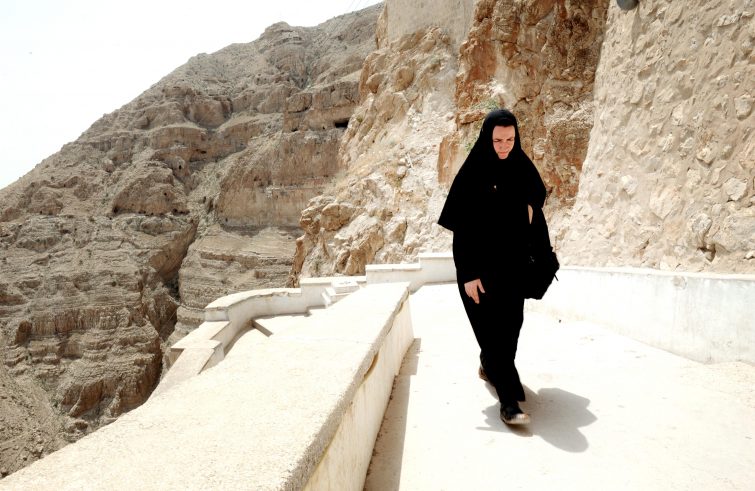
Again this year, with the beginning of the Lenten season, as Christians we are faced with the opportunity – highly uncommon for most circumstances of everyday life – to challenge ourselves, thereby rekindling the hope that somehow, somewhere within ourselves, is concealed a hidden beauty that is only waiting to be rediscovered, not to be invented from scratch, stolen, counterfeited, seized or simulated – for this is the true affliction: our instinctive conviction that goodness does not dwell within us, but must be painstakingly obtained. Such implicit notion, extended as a tenth of a micron and yet fatal, constitutes the gateway to all of our temptations, indeed it is the first temptation, the one that gives rise of all subsequent enticements. The notion that we are neither loved nor lovable, and that if we do not do it ourselves no one will love us, is ingrained within us due to our diligent attentiveness and continuous listening.
Here lies the first “brick” of every temptation, usually ignored, thereby reducing the temptation to lure for something. Big mistake! Temptation is first and foremost a suggestion for interpretation that starts with a negative detail it eventually expands, so that the whole picture is lost sight of. It suggests a shortcoming – whether real or assumed – and prompts us to read ambivalent situations through one-sided negative lenses. Such is the Enemy working us against us: everything else is a corollary and consequence. The devil offers us his view of reality, an utterly dark perspective, with no nuances or glimmers of light. “”What Satan enjoys is the fact that Benjamin has plunged into a most lucid blindness. The priest has become blind to all the gifts God has bestowed upon him. At the same time, he is overcome by the merciless awareness of his own weaknesses.” This is how Jean Mercier, author of the highly enjoyable “Monsieur le curé fait sa crise”, described the desolation into which the priest – the novel’s main character – falls when he embraces this utterly biased and unjust, yet absurdly credible gaze for us foolish small men, enamored of our interpretations of reality to the point of preferring them to what is real.
In fact, the problem is not so much that the Tempter is actually doing his job, suggesting to us his very own gloomy interpretations of the facts. Indeed, what is most tragic is the fact that we welcome them as our own, oblivious to the fact that life involves the dimension of spiritual struggle, and thus we mistake temptations for stages of our personal psychological development, and hence we don’t fight them because virtually all of us inevitably succumb, some more, some less, to a widespread form of “psychologism” that dismisses the spiritual aspect, that which indeed animates the psyche, but distinguishes itself from it as having a different, transcendent source. While it is true and clear that the Holy Spirit and the Tempter communicate to our consciousness through mental processes (thoughts and feelings), it is also true that the nature of those processes do not exhaust the realm of our interiority, but rather must lead us to retrace the (spiritual) origin of such impulses, so as to embrace the radiant, constructive and inspired ones, while rejecting those stirred by the gloomy and shapeless depths of our pre-human drives, where the the devil prowls around “like a roaring lion looking for someone to devour.” (1 Pet. 5:8).
By mistaking a temptation for a mere “thought” we are harboring it in our consciousness, where it is free to inhabit us and alter our interpretation of reality…And when it dawns on us that maybe this reading of the facts is wrong, we challenge those who challenge us, and defend the opinion that has since matured within us, and if it fails to change it will cause us to forever miss the opportunity for true joy.
In the passages accompanying this first Sunday of Lent in Cycle A, we see how Eve errs by dialoguing with Temptation, even to the point of assuming its point of view, and in a garden of which she is told it was full of trees “pleasing to the sight and good for food” (Gen. 2: 9), purposely planted after the creation of man, for him. The Tempter persuades her to absolutize the detail, and to see only the tree that was forbidden to them at the time, and then see only that fruit as “good for food and pleasing to the eye” (Gen 3:6). She thus becomes oblivious to the context and, henceforth suspicious about God’s intentions, wishes to hurry to fill the void by taking rather than receiving. She does not accept the tension of expectation and trust, and grabs.
On the other side, we see the new Adam, the son of that new Eve who had given Him flesh with an act of utter trust, not falling for the ploy: he does not get entangled in the moment and the detail, he cherishes the memory of the gifts, he can handle the tension of waiting to experience everything as gift. In this ability to surrender by stepping into the void, Christ reveals not only His true dignity as Son, but also the true dignity of human nature as such, when He accepts to believe in His own worth, and indeed it is said in Matthew’s passage that in the end “angels came to Him and served Him”: when man stops being content with the interpretations of his life based on traumas and shortcomings, and the petty means of satisfying his cravings, he begins to become a god served by angels. What temptation had promised only to eventually withdraw (“You would be like God,” Gen. 3:5), God prepares in abundance for those who accept the real challenge and the major spiritual struggle: to wait and trust in Him.










